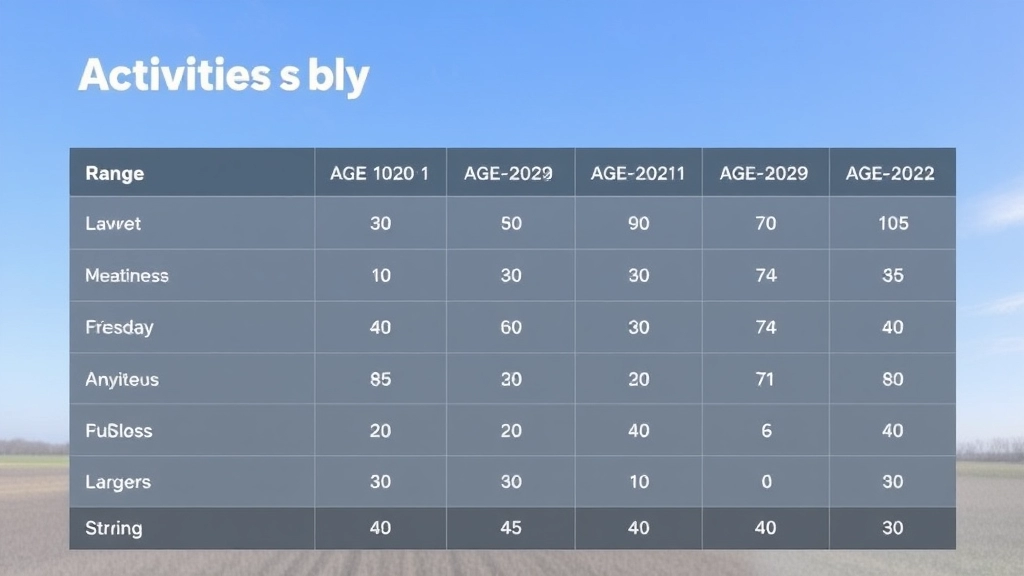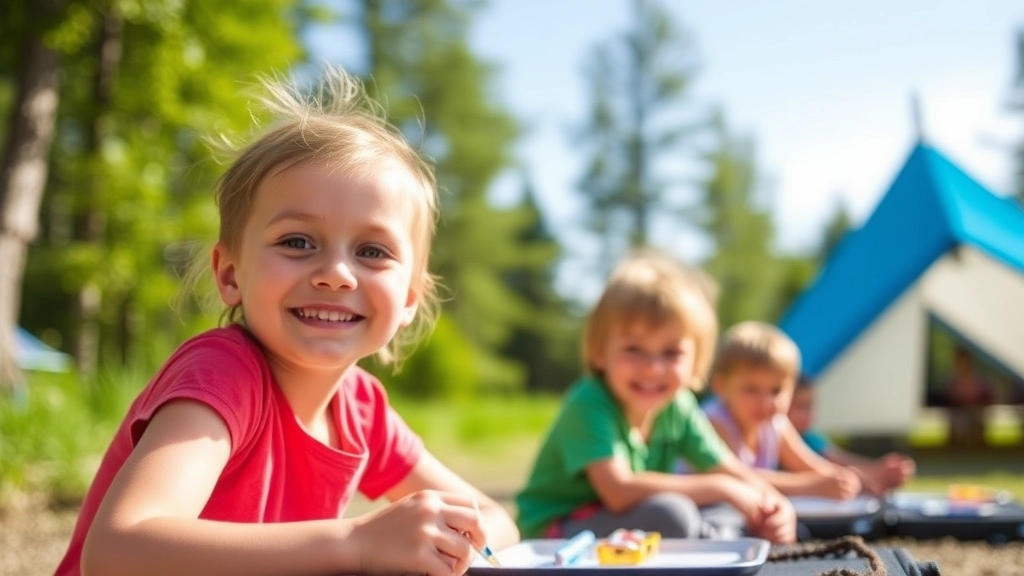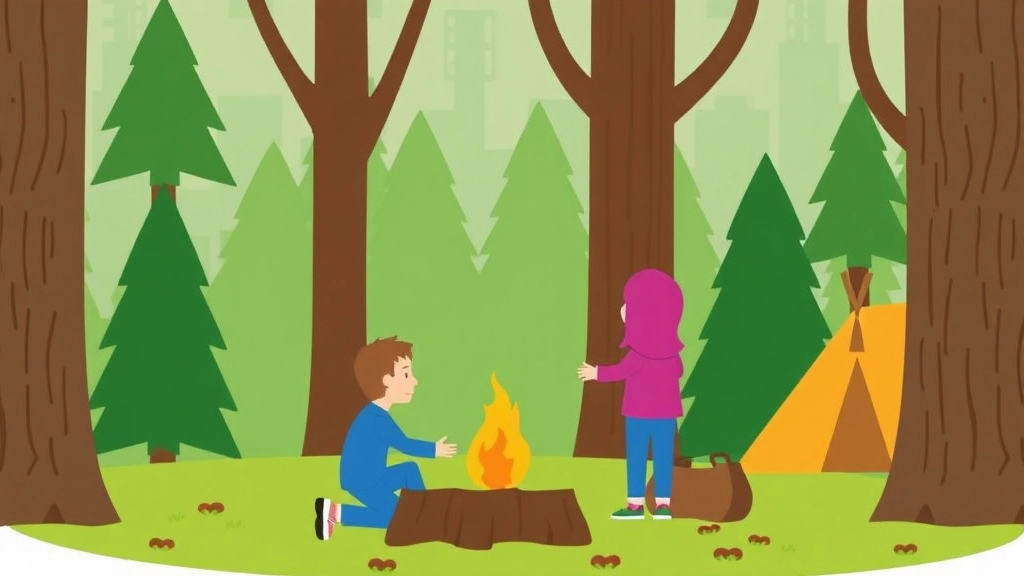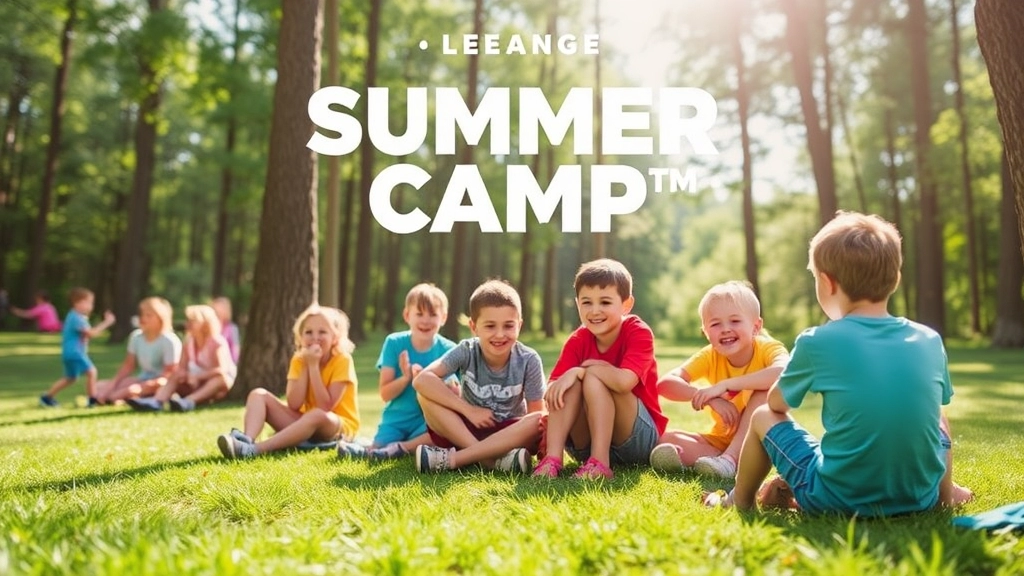Choosing the Right Summer Camp for Your Child
Choosing the right summer camp for your child can feel like navigating a maze. With so many options based on age groups, activities, and safety considerations, it’s easy to feel overwhelmed. This article is your ultimate guide to understanding how to select the perfect summer camp tailored to your child’s age. From preschoolers to teens, we cover everything you need to know to make an informed decision.
Importance of Age-Appropriate Camps
We’ll delve into the importance of age-appropriate camps, the types of activities suited for different age ranges, and tips for parents on evaluating camp options. You’ll also find insights on transitioning between age groups, safety considerations, and popular camp themes by age. By the end of this article, you’ll be well-equipped to choose a summer camp that ensures your child has a fun, engaging, and safe experience.
Let’s Make This Summer Unforgettable!
So, let’s dive in and make this summer unforgettable for your little one!
Age Groups for Summer Camps
Alright, let’s dive straight in. One of the biggest questions parents have is, “Which age group camp should I enrol my child in?” It’s a legit worry. You don’t want your kid feeling out of place or overwhelmed. So, how do you figure it out?
Why Age Groups Matter
The age group of a summer camp can define the entire experience for your child. Picking the right age group means your child gets to:
- Make friends easily: Kids bond better with peers their own age.
- Participate in suitable activities: Age-appropriate activities ensure safety and engagement.
- Feel comfortable: No one likes feeling like the odd one out.
Common Age Group Categories
Most summer camps break down their age groups into similar categories. Here’s a quick rundown:
- Preschoolers (Ages 3-5): Think simple, fun, and lots of supervision.
- Younger Kids (Ages 6-8): More structured activities but still plenty of play.
- Tweens (Ages 9-12): A mix of fun and learning, with some independence.
- Teens (Ages 13-15): Focused on skill-building and social activities.
- Older Teens (Ages 16-18): Leadership roles and advanced activities.
Real Talk: The Parent’s Perspective
When my buddy Sarah was picking a camp for her 7-year-old, she was torn. Should she go for a camp that caters to ages 6-8, or push it to 9-12 for a bit more challenge? She ended up choosing the 6-8 camp, and her son had the time of his life. He made friends, felt comfortable, and came back with stories every day.
Internal Linking Opportunity
Don’t forget, if you’re also curious about the activities each age group enjoys, check out our detailed breakdown in the Summer Camp Lesson Plans section.
Activities by Age Range

Worried about finding the right activities for your kid’s summer camp?
You’re not alone.
Parents often stress about whether their child will be engaged, safe, and happy.
Let’s break it down by age range.
Ages 4-6: The Little Explorers
For the youngest campers, think simple and fun.
- Nature walks: Kids love discovering bugs and plants.
- Arts and crafts: Keeps their hands busy and minds creative.
- Storytime: Perfect for winding down after a busy day.
- Water play: Splashing around is a hit, but always supervised.
Ages 7-9: The Adventurers
These kids are ready for a bit more action.
- Sports: Football, swimming, and even basic rock climbing.
- Science experiments: Easy, hands-on activities like making slime.
- Group games: Capture the Flag or scavenger hunts.
- Music and dance: Let them groove and move.
Ages 10-12: The Explorers
Pre-teens need a mix of challenge and fun.
- Team sports: Basketball, volleyball, and more.
- Outdoor skills: Basic survival skills and orienteering.
- Creative workshops: Drama, painting, or even coding.
- Field trips: Visits to museums or nature reserves.
Ages 13-15: The Trailblazers
Teenagers crave independence and challenge.
- Advanced sports: Mountain biking, kayaking, or archery.
- Leadership activities: Team-building exercises and mentoring.
- Tech camps: Robotics, app development, or video production.
- Adventure trips: Overnight camping or hiking expeditions.
Ages 16-18: The Leaders
Older teens often enjoy leadership roles and specialised activities.
- Counselor-in-training programs: Prepping them for future roles.
- Community service projects: Volunteering opportunities.
- Career-oriented workshops: Cooking, photography, or entrepreneurship.
- Intensive sports training: For those serious about their sport.
Why It Matters
Choosing the right activities based on age isn’t just about fun.
It’s about growth, learning, and making sure your child is safe and engaged.
When activities match their developmental stage, kids are more likely to thrive.
Quick Tips for Parents
- Ask about staff-to-child ratios: More supervision means safer play.
- Check the camp’s credentials: Accreditation matters.
- Visit the camp: See the environment firsthand.
- Talk to other parents: Get real feedback.
Choosing the Right Camp for Your Child’s Age
Hey there, ever found yourself scratching your head, wondering, âHow do I pick the right summer camp for my kid’s age?â Trust me, you’re not alone. Many parents are in the same boat, trying to navigate the sea of options out there. Let’s dive into this together and make it simple.
Why Age Matters
First off, age-appropriate camps are crucial for your child’s development. You want a camp that matches their interests and abilities, right? It’s like finding the perfect pair of shoesâtoo big or too small, and it just doesn’t work.
What to Look For
When choosing a camp, consider these key points:
- Age Groups: Camps are often divided into specific age ranges. Check if they align with your child’s current stage.
- Activities: Ensure the activities are suitable for your child’s age. Younger kids might enjoy crafts and nature walks, while older ones might prefer sports or tech workshops.
- Staff Experience: Look for camps with experienced staff who understand the needs of different age groups.
Real-Life Example
Let me share a quick story. My friend Sarah was looking for a camp for her 8-year-old. She found one that was perfect on paper but realised it was geared more towards teenagers. The result? Her son felt out of place and didn’t enjoy it. Lesson learned: always double-check the camp’s focus.
Questions to Ask
Before you sign up, ask these questions:
- What’s the typical age range for campers?
- How do they group kids for activities?
- Are there specific programmes tailored to different ages?
Benefits of Getting it Right
Choosing the right camp can make a world of difference:
- Boosts Confidence: Kids thrive when they’re in the right environment.
- Encourages Growth: Age-appropriate activities help them learn and grow.
- Builds Friendships: Being with peers of the same age fosters strong connections.
For more insights on selecting the best camps, check out our guide on types of summer camps and discover how to find the perfect fit for your child. Additionally, if you’re considering financial aspects, our article on average summer camp costs and budget tips can help you plan effectively.
Benefits of Age-Appropriate Camps

Ever wondered if your child is in the right summer camp?
I get it.
Choosing the right camp can feel like a big deal.
Here’s why age-appropriate camps matter.
Why Age Matters
Kids learn and grow differently at each stage.
An age-appropriate camp ensures your child gets the most out of their experience.
Imagine sending a 7-year-old to a camp designed for teenagers.
Not ideal, right?
Tailored Activities
Age-focused activities mean:
- Skills suited to their development
- Challenges that are just right
- Social interactions with peers
Confidence Boost
When kids are in the right environment, they thrive.
They build confidence by mastering tasks fit for their age.
Safety First
Safety is a biggie.
Camps designed for specific age groups know the risks and how to manage them.
No need to worry about your little one getting overwhelmed.
Real Stories
I remember chatting with a friend over coffee.
She sent her 10-year-old to a teen camp by mistake.
The result?
Her child felt out of place, and it was a tough summer.
But the next year, in an age-appropriate camp, everything changed.
Happiness and growth flourished.
Key Takeaways
Here’s what to look for:
- Activities: Are they age-suitable?
- Staff Training: Do they understand age-specific needs?
- Environment: Is it safe and supportive?
Tips for Parents: Evaluating Camp Options
Wondering how to choose the right summer camp for your child? You’re not alone. With so many options, it can feel overwhelming. Let’s break it down so you can make an informed decision.
What Matters Most?
When evaluating camp options, age-appropriate camps are key. You want a camp that fits your child’s age and interests. Here’s how to get started:
1. Know Your Child’s Interests
- Sports, arts, or science? Find out what excites them.
- Ask them directly or observe what they naturally gravitate towards.
2. Check the Camp’s Reputation
- Read reviews and ask other parents.
- Visit the camp if possible. Get a feel for the environment.
3. Safety First
- Inquire about safety protocols. Are there trained staff and first aid available?
- Check the staff-to-child ratio. More supervision means more safety.
4. Evaluate the Activities
- Make sure activities are age-appropriate and engaging.
- Look for a mix of learning and fun.
Real Concerns, Real Solutions
Worried about cost? Camps can be pricey, but there are affordable options. Scholarships or sliding scale fees might be available.
Concerned about homesickness? Choose a camp with a good support system. Staff should be trained to help kids adjust.
Example: Choosing for a 10-Year-Old
Let’s say your child is 10 and loves science. Look for camps that offer hands-on experiments or tech workshops. This ensures they’re not only entertained but also learning.
Making the Final Decision
- Trust your instincts. If something feels off, it probably is.
- Involve your child in the decision-making process. They’ll be more excited and less anxious.
For more detailed guidance, check out our ultimate guide to summer camp layout design and explore our summer camp guide to find the perfect fit for your child.
Common Questions about Camp Ages

Alright, let’s dive into the nitty-gritty.
Common Questions about Camp Ages—we all have them, right?
Parents often stress about this topic.
So, let’s tackle it head-on.
1. What Age Should My Child Start Camp?
This is a biggie.
Parents ask this all the time.
Here’s the scoop:
- Ages 3-5: Perfect for day camps. Think short, sweet, and packed with fun.
- Ages 6-8: Ready for a bit more. Day camps or short overnight stays.
- Ages 9-12: Go for longer overnight camps. They’re ready.
- Teens: The sky’s the limit. Adventure camps, leadership programs, you name it.
2. Are There Camps for Every Age Group?
Absolutely.
From toddlers to teens, there’s something for everyone.
Just need to find the right fit.
3. How Do Camps Group Kids by Age?
Camps usually split kids into tight age brackets.
Why?
To make sure activities are spot-on for their development stage.
4. What If My Child Feels Out of Place?
It happens.
But good camps have staff trained to handle this.
They’ll help your kiddo feel right at home.
5. Can Siblings of Different Ages Attend the Same Camp?
Yes and no.
Some camps cater to a broad age range.
Others are more specific.
Look for camps with family programs if you want them together.
6. How Do I Know If the Camp Is Right for My Child’s Age?
Research, research, research.
- Read reviews
- Visit the camp
- Talk to the staff
Trust your gut.
7. What About Safety for Different Ages?
Safety is paramount.
Camps have different protocols based on age.
Younger kids need more supervision.
Older kids get more freedom but still within safe limits.
8. Do Camps Offer Age-Appropriate Activities?
You bet.
From crafts for the little ones to hiking for teens.
Activities match the age group’s interests and abilities.
9. Can My Child Transition Between Age Groups?
Yes, and it’s a big deal.
Camps often have programs to ease this transition.
They make sure kids are comfortable moving up.
10. What If My Child Has Special Needs?
Look for inclusive camps.
Many offer tailored programs for kids with special needs.
Ask about their policies and staff training.
In a nutshell:
Camp age questions are super common.
And totally normal.
Focus on finding the right fit for your child.
And remember, camps are designed to be fun and enriching.
Transitioning Between Age Groups in Camps
Ever wondered how your kid will handle moving from one age group to another at summer camp? It’s a common concern, and trust me, you’re not alone. Transitioning between age groups in camps can be a big deal for both kids and parents. But don’t sweat itâI’ve got some tips to make this shift as smooth as possible.
Why Transitioning Matters
First off, let’s talk about why this transition is such a big deal. Kids grow up fast, and their needs change just as quickly. The activities that thrilled them at age 6 might seem boring at age 10. Camps know this and design their programs to fit different age groups. But moving up an age group can still be a bit of a shock for your child.
Signs Your Kid is Ready to Move Up
How do you know when your child is ready to move up to the next age group? Here are some signs:
- Boredom: If your child is no longer excited about the activities in their current group, it might be time to move up.
- Skill Level: If they’re mastering the activities too quickly, they need more of a challenge.
- Social Cues: Pay attention to how they interact with kids in their current group. Are they seeking out older kids to hang with?
Making the Transition Smooth
Alright, so your kid is ready to level up. Here’s how to make the transition smooth:
- Talk About It: Explain what changes they can expect. New activities, different counsellors, maybe even a new location within the camp.
- Visit the New Group: If possible, arrange a visit to the new age group’s area. Familiarity can ease anxiety.
- Buddy System: See if a friend is moving up too. Having a buddy can make all the difference.
- Encourage Independence: Teach them to ask questions and seek help when needed. Independence is key at this stage.
Real Stories, Real Transitions
When my niece transitioned from the 6-8 age group to the 9-11 group, she was nervous. But guess what? She ended up loving the new challenges. She went from making simple crafts to building a birdhouse, and from basic swimming to learning how to kayak. The new activities kept her engaged and excited.
What Camps Do to Help
Camps aren’t clueless about these transitions. Many have orientation days or transition programs to help kids adjust. They might pair up newcomers with a “camp buddy” from the older group to show them the ropes.
FAQs About Transitioning Age Groups
- Will my child feel left out? Camps work hard to make sure every kid feels included. If your child feels left out, talk to the camp staff.
- Are the activities too hard? Camps design activities to be age-appropriate. If something seems too challenging, it’s usually meant to be a fun challenge, not a stressor.
- What if my child wants to go back to the younger group? It’s rare, but it happens. Speak with the camp director to explore options.
Safety Considerations for Different Ages

Worried about your child’s safety at summer camp? You’re not alone.
Safety is a top priority for any parent sending their child to camp. But what should you be looking out for, especially when different age groups have different needs?
Let’s break it down.
Infants and Toddlers (0-3 Years)
These little ones need constant supervision.
- High staff-to-child ratio: Look for camps that have plenty of staff to watch over the kids.
- Safe play areas: Ensure there are no sharp edges or small parts that could be swallowed.
- First-aid trained staff: This is non-negotiable. Accidents happen, and staff should be ready.
Preschoolers (3-5 Years)
Preschoolers are curious and love to explore. Safety measures should include:
- Secure fencing: Keeps them from wandering off.
- Age-appropriate activities: No climbing walls or deep pools.
- Emergency protocols: Staff should know what to do if a child gets hurt or lost.
Primary School Kids (6-12 Years)
This age group is more independent but still needs guidance.
- Structured activities: Keeps them engaged and reduces the risk of accidents.
- Buddy system: Encourages kids to look out for each other.
- Regular headcounts: Ensures no one is missing.
Teenagers (13-18 Years)
Teens crave freedom but still need boundaries.
- Clear rules: About curfews, activities, and behaviour.
- Emergency contact info: Teens should know how to reach staff at all times.
- Mental health support: Camps should have resources for teens who may feel anxious or homesick.
General Safety Tips for All Ages
- Medical staff on-site: Whether it’s a nurse or a first-aid certified counsellor.
- Background checks for staff: Ensures your kids are in safe hands.
- Regular safety drills: Prepares everyone for emergencies like fires or severe weather.
So, what’s the takeaway?
When choosing a camp, safety considerations should match the age group of your child.
From toddlers to teens, each age group has unique needs that camps should meet.
Remember, a safe camp is a fun camp.
By focusing on these safety measures, you can ensure your child has a memorable and secure summer experience.
For more tips on choosing the right camp, check out our section on Evaluating Camp Options.
Popular Summer Camp Themes by Age
Ever wondered what summer camp themes are best for your child’s age? Let’s dive right in.
For the Little Ones (Ages 4-6)
What do they love?
- Storybook Adventures: Think Peter Pan, Alice in Wonderland. Kids love stepping into their favourite tales.
- Animal Kingdom: Camps where they can learn about animals, maybe even meet a few.
- Arts and Crafts: Simple, fun, and messy. Perfect for this age.
Early Primary (Ages 7-9)
What’s the buzz here?
- Science Explorers: Hands-on experiments and mini-labs. Kids are natural scientists.
- Outdoor Adventures: Hiking, scavenger hunts, and nature walks. They’ve got energy to burn.
- Sports Mania: Football, swimming, and more. Keeps them active and engaged.
Tweens (Ages 10-12)
What gets them excited?
- Tech Camps: Coding, robotics, and game design. Perfect for the tech-savvy.
- Creative Arts: Drama, music, and advanced crafts. Let them express themselves.
- Survival Skills: Camping, knot-tying, and basic first aid. They love feeling capable.
Teens (Ages 13-15)
What’s trending?
- Leadership Camps: Team-building, public speaking, and project management. Prepping them for the future.
- Adventure Camps: Rock climbing, kayaking, and more. Thrill-seekers, rejoice.
- Special Interest Camps: Photography, culinary arts, and fashion design. Let them dive deep into their passions.
Older Teens (Ages 16-18)
What keeps them engaged?
- Career Prep: Internships, resume building, and interview skills. Get them ready for the real world.
- Advanced Adventure: Expeditions, wilderness survival, and advanced sports. Push their limits.
- Volunteering Camps: Community service projects. Giving back is big at this age.
Real Talk
Parents often ask, âIs my kid too young for this?â or âWill they be bored?â
Trust me, choosing the right theme can make all the difference.
Quick Tips for Parents
- Talk to Your Child: What are they interested in? Their input is gold.
- Check Reviews: Other parents’ experiences can be eye-opening.
- Visit the Camp: If possible, see it in action.
Frequently Asked Questions (FAQs) about Summer Camp Ages
1. What Age Should My Child Start Camp?
This is a biggie. Parents ask this all the time. Here’s the scoop:
- Ages 3-5: Perfect for day camps. Think short, sweet, and packed with fun.
- Ages 6-8: Ready for a bit more. Day camps or short overnight stays.
- Ages 9-12: Go for longer overnight camps. They’re ready.
- Teens: The sky’s the limit. Adventure camps, leadership programs, you name it.
2. Are There Camps for Every Age Group?
Absolutely. From toddlers to teens, there’s something for everyone. Just need to find the right fit.
3. How Do Camps Group Kids by Age?
Camps usually split kids into tight age brackets. Why? To make sure activities are spot-on for their development stage.
4. What If My Child Feels Out of Place?
It happens. But good camps have staff trained to handle this. They’ll help your kiddo feel right at home.
5. Can Siblings of Different Ages Attend the Same Camp?
Yes and no. Some camps cater to a broad age range. Others are more specific. Look for camps with family programs if you want them together.
6. How Do I Know If the Camp Is Right for My Child’s Age?
Research, research, research.
- Read reviews
- Visit the camp
- Talk to the staff
Trust your gut.
7. What About Safety for Different Ages?
Safety is paramount. Camps have different protocols based on age. Younger kids need more supervision. Older kids get more freedom but still within safe limits.
8. Do Camps Offer Age-Appropriate Activities?
You bet. From crafts for the little ones to hiking for teens. Activities match the age group’s interests and abilities.
9. Can My Child Transition Between Age Groups?
Yes, and it’s a big deal. Camps often have programs to ease this transition. They make sure kids are comfortable moving up.
10. What If My Child Has Special Needs?
Look for inclusive camps. Many offer tailored programs for kids with special needs. Ask about their policies and staff training.
In a nutshell: Camp age questions are super common. And totally normal. Focus on finding the right fit for your child. And remember, camps are designed to be fun and enriching.
References
-
Age-Appropriate Camp Activities – Verywell Family
-
Age Group Characteristics – American Camp Association
-
How to Choose a Summer Camp – ParentMap

